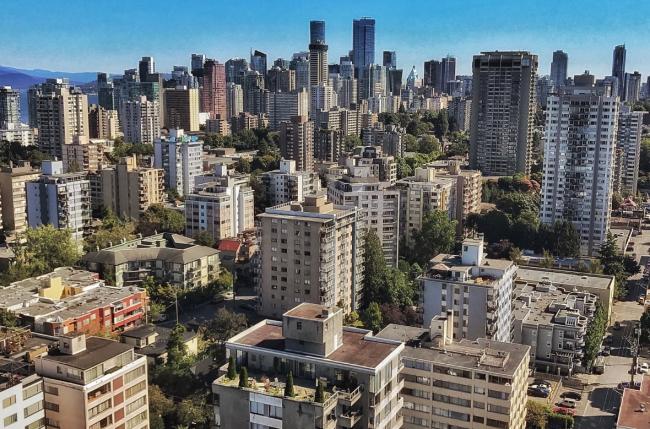Articles Menu

Given that the majority of the global population lives in urban centres, cities are responsible for organizing many of the activities that contribute to greenhouse gas emissions, such as public transportation, land use planning and construction.
And yet as countries roll out pledges to tackle the climate crisis, many cities are finding they don't have the input and leeway they need to transition to a greener economy.
"Cities are at the front edge of dealing with this crisis," said Shauna Sylvester, executive director at Simon Fraser University's Morris J. Wosk Centre for Dialogue.
Urban areas are highly vulnerable to the effects of climate change, with wildfires and rising sea levels being just two of several threats that Vancouver and other Canadian cities have had to face this year alone, she said.
This summer's heat dome "is an example of what British Columbia went through," Sylvester said in an interview with What On Earth host Laura Lynch. But because of a lack of political or financial leverage, cities "don't have the capacity to really take action and deal with the issues that they have to confront."
Sylvester is the lead convener of Cities on the Road to Glasgow, a working group on climate action, and will be attending the COP26 climate summit in Scotland next month. At the top of her list of demands for cities is more money, more authority and a seat at the climate negotiating table.
"We want a very different kind of relationship which is much closer and acknowledges the role that cities play in climate action," said Sylvester, "and gives them the capacity to act, since [cities] control about 60 per cent of the emissions."
Under the Paris Agreement, Canada's new Nationally Determined Contribution (NDC) is a pledge to reduce emissions by 40 to 45 per cent below 2005 levels by 2030. Sylvester said this ambitious commitment requires both significant funding and quick, decisive action from all levels of government.
A report from the Morris J. Wosk Centre for Dialogue includes a number of calls to action, including the recognition of cities in the NDC, federal and provincial funding to advance climate efforts and support in data collection to inform policy creation.
CBC reached out to Environment and Climate Change Canada for comment on Sylvester's suggestions, but did not receive a response in time for publication.
Another solution suggested by Sylvester is to embed city representatives in each of the federal ministries and create formalized relationships so that cities have a clear part to play in national and international negotiations and policy development.
"Ultimately, whatever Canada agrees to internationally has to come home to roost," said Sarah Burch, Canada Research Chair in sustainability, governance and innovation and associate professor in the department of geography and environmental management at the University of Waterloo. "It hits the ground, really, in cities and communities in Canada and around the world."
Burch emphasized the need for each level of government to work together and for cities to have a say in the governance, tools and policies that will be implemented within their jurisdiction.
"We will inevitably and continuously fail to make speedy-enough progress if all levels of government aren't pulling in the same direction on this," said Burch.
These changes would also present an opportunity to share potential solutions among cities.
"We need to roughly halve global emissions by 2030 if we're to have any chance whatsoever of avoiding the worst effects of climate change," said David Miller, a former mayor of Toronto and managing director of international diplomacy for C40 Cities, a global alliance of city mayors.
"That means we need to take things that are working now, somewhere, and do them everywhere. And the best examples of what's working somewhere to lower greenhouse gas emissions and improve people's lives are in cities."
One solution he highlighted is broad electrification of public transportation, such as in Shenzhen, China, where both the taxi and bus fleets are entirely electric. Meanwhile, New York City has mandated that existing commercial buildings over a certain size have to cut their emissions by 40 per cent by 2030.
C40 is a partner in the global Race to Zero campaign that's been growing ahead of COP26 to mobilize businesses, cities, regions and investors to make pledges and plans to achieve net-zero emissions by 2050.
"People are in cities, our economies are in cities and greenhouse gas emissions are in cities," said Miller. "That means that where there are solutions, there is a huge opportunity to address climate change."
— Dannielle Piper
[Top photo: (Christer Waara/CBC)]